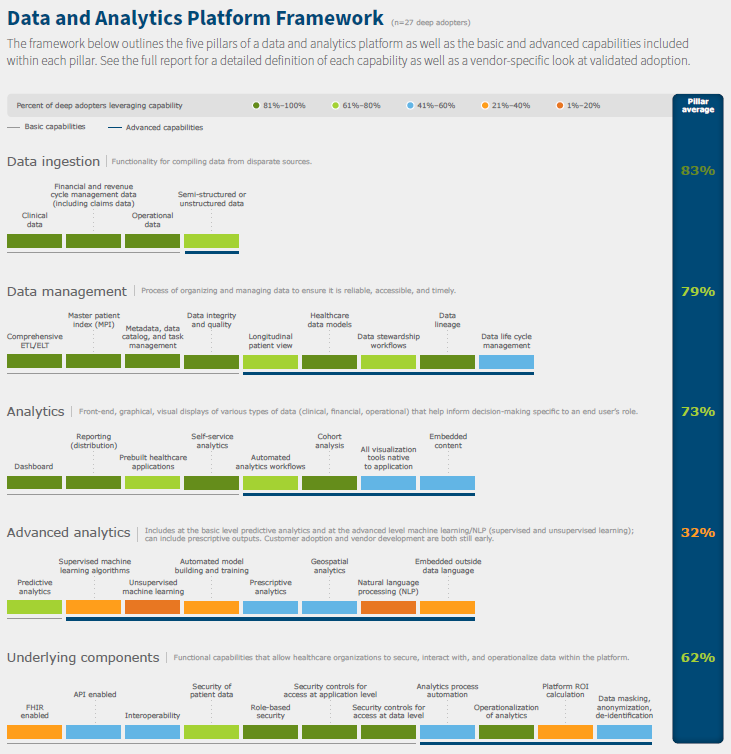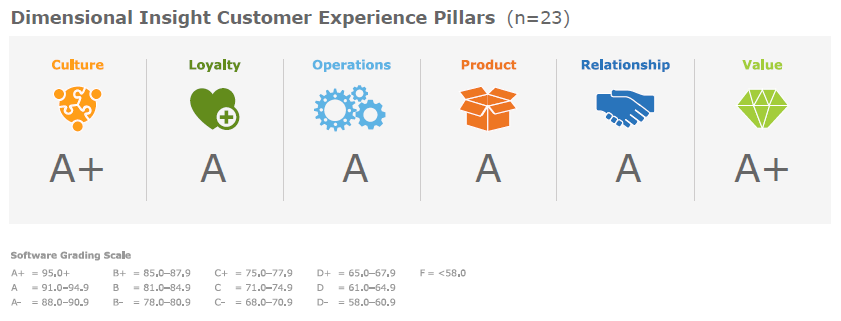KLAS Research recently released its Data and Analytics Platforms 2021 report, which provides insight into how deep platform adopters in hospitals and health systems are using both basic and advanced analytics capabilities.
As healthcare organizations require broader and deeper analytics for more sophisticated decision-making, they need an end-to-end analytics platform that meets their needs. The KLAS report evaluated vendors on user adoption across KLAS’ five pillars of a data and analytics platform, and also included customer experience data so users can see how vendors perform in real-life deployments. Let’s examine some of the takeaways from the report.
1. Hospitals are using most basic analytics capabilities, but there is room for improvement
The KLAS report outlines the five pillars of a data and analytics platform: data ingestion, data management, analytics, advanced analytics, and underlying components. The report shows that when it comes to the basic capabilities in these areas, deep adopters have implemented most of them.
However, there are some basic capabilities that are only used by less than 60% of these deep adopter hospitals, and they are all in the “underlying components” pillar. Between 41% and 60% of hospitals are using “API enabled” and “Interoperability” capabilities, and 21% to 40% of hospitals are using “FHIR enabled” capabilities. This shows that there is room for improvement when it comes to sharing and integrating data from different sources.

2. Despite the hype, hospitals are slow to adopt advanced analytics
We’ve all heard a lot about advanced analytics, particularly around artificial intelligence and machine learning. However, the KLAS report shows that even the hospitals that are considered the deepest adopters are slow to implement some of these technologies, showing we are still in early days with advanced functionality.
The highest implemented “advanced analytics” technology is predictive analytics, with 61% to 80% of deep adopters using it. Technologies such as unsupervised machine learning and natural language processing (NLP) are being used by less than 20% of deep adopter hospitals.
3. Dimensional Insight continues to lead the pack in outcomes and functionality
Part of the KLAS report includes vendor ratings and customer feedback so users can understand how vendors perform in actual customer deployments. Of rated vendors, Dimensional Insight leads with high scores in both “drives tangible outcomes” and “product has needed functionality.” According to KLAS, Dimensional Insight, “Generates high loyalty and excitement with customer-centric approach; all respondents are satisfied or highly satisfied. Seen as a partner who keeps promises and seeks to understand customer needs.”
In addition, KLAS publishes grades that go along with its six customer experience pillars. Based on customer feedback, Dimensional Insight was the only vendor to receive all “A’s” in the six pillars, with the following grades:
- A+ in Culture
- A in Loyalty
- A in Operations
- A in Product
- A in Relationship
- A+ in Value

Learn more
KLAS subscribers can learn more about the data and analytics category by going to the KLAS website.
- Solving Hospital CEOs’ Pressing Challenges With Analytics - April 15, 2024
- Navigating the Wellness Wave: Wine & Spirits Data Strategy - April 9, 2024
- Takeaways from HIMSS24 - March 26, 2024


